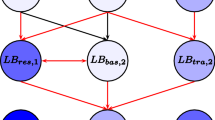Abstract
In this paper, we consider a three-machine permutation flow-shop scheduling problem where the criterion is to minimize the total completion time without idle times subject to the minimum makespan on the second machine. This problem is NP-hard while each of the objective functions alone can be optimized in polynomial time. We develop a branch-and-bound algorithm with effective branching rules and dominance properties which help to reduce the search space. By our computational experiments, the branch-and-bound algorithm is comparable to a recent mixed integer programming solver and, for some kinds of problem instances, the branch-and-bound algorithm outperforms the solver. On the other hand, the computational result would indicate that the hierarchical scheduling problems are essentially hard in both theoretical and computational points of view.
Similar content being viewed by others
References
Akkan C and Karabati S (2004). The two-machine flowshop total completion time problem: Improved lower bounds and a branch-and-bound algorithm. Eur J Opl Res 154: 420–429.
Bansal SP (1977). Minimizing the sum of completion times of n jobs over m machines in a flowshop—a branch and bound approach. AIIE Trans 9: 306–311.
Carlier J and Rebaï I (1996). Two branch-and-bound algorithms for the permutation flow shop problem. Eur J Opl Res 90: 238–251.
Cheng J, Kise H and Matsumoto H (1997). A branch-and-bound algorithm with fuzzy inference for a permutation flow shop scheduling problem. Eur J Opl Res 96: 578–590.
Della Croce F, Ghirardi M and Tadei R (2002). An improved branch and bound algorithm for the two-machine total completion time flowshop problem. Eur J Opl Res 139: 293–301.
Della Croce F, Narayan R and Tadei R (1996). The two machine total completion time flowshop problem. Eur J Opl Res 90: 227–237.
Framinan JM, Gupta JND and Leisten R (2004). A review and classification of heuristics for permutation flow-shop scheduling with makespan objective. J Opl Res Soc 55: 1243–1255.
Framinan JM, Leisten R and Ruiz-Usano R (2005). Comparison of heuristics for flow-time minimisation in permutation flowshops. Comput Oper Res 32: 1237–1254.
Garey MR, Johnson DS and Sethi R (1976). The complexity of flowshop and jobshop scheduling. Math Opl Res 1: 117–129.
Gupta JND, Hennig K and Werner F (2002). Local search heuristics for two-stage flow shop problems with secondary criterion. Comput Opl Res 29: 123–149.
Gupta JND, Neppalli VR and Werner F (2001). Minimizing total flow time in a two-machine flowshop problem with minimum makespan. Int J Prod Econ 69: 323–338.
Ignall E and Schrage L (1965). Applications of the branch-and-bound technique to some flow-shop scheduling problems. Opns Res 13: 400–412.
ILOG Inc (2002). ILOG CPLEX 8.0 reference manual.
Johnson SM (1954). Optimal two- and three-stage production schedules with set-up times included. Naval Res Logist Quart 1: 61–68.
Ladhari T and Haouari M (2005). A computational study of the permutation flow shop problem based on a tight lower bound. Comput Oper Res 32: 1831–1847.
Martello A and Toth P (1990). Knapsack Problems—Algorithms and Computer Implementations. Wiley: Chichester.
Potts CN (1980). An adaptive branching rule for the permutation flow-shop problem. Eur J Opl Res 5: 19–25.
Rajendran C (1992). Two-stage flowshop scheduling problem with bicriteria. J Opl Res Soc 43: 871–884.
Szwarc W (1981). Extreme solutions to the two-machine flowshop problem. Naval Res Logist Quart 28: 103–114.
T'kindt V and Billaut JC (2002). Multicriteria Scheduling—Theory, Models and Algorithms. Springer: New York.
T'kindt V, Gupta JND and Billaut JC (2003). Two-machine flowshop scheduling with a secondary criterion. Comput Opl Res 30: 505–526.
Yanai S and Fujie T (2004). On a dominance test for the single machine scheduling problem with release dates to minimize total flow time. J Opl Res Soc Japan 47: 96–111.
Acknowledgements
We thank anonymous referees for their valuable comments and suggestions. We are also grateful to Professors Teruhiko Yoshida, Toshio Hamada and Kensaku Kikuta for their helpful comments.
Author information
Authors and Affiliations
Corresponding author
Rights and permissions
About this article
Cite this article
Yanai, S., Fujie, T. A three-machine permutation flow-shop problem with minimum makespan on the second machine. J Oper Res Soc 57, 460–468 (2006). https://doi.org/10.1057/palgrave.jors.2602014
Received:
Accepted:
Published:
Issue Date:
DOI: https://doi.org/10.1057/palgrave.jors.2602014




